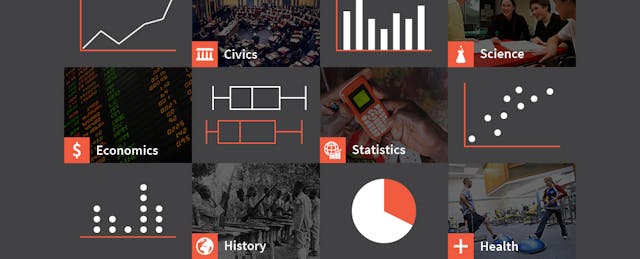“Data science” is all the rage these days. After all, the ability to analyze and tease out trends from numbers is a skill applicable to many fields. In the media industry, some suggest we may be entering a “golden age” of data journalism, with stories supplemented and backed by pretty charts and graphs.
A number of prominent universities, from UC Berkeley to New York University, have taken note. Recently, they've started offering master’s degrees in data science, presumably to prepare students for what some have called the “sexiest job of the 21st century.”
Despite its growing popularity, “data science is still a very elite field, catering to smart people who can pay $60,000 for a degree,” says Tuva Labs co-founder, Harshil Parikh. His New York City-based startup wants to bring these skills to K-12 classrooms and offer students an earlier exposure into the the world of data. “Our goal is to make this an accessible field that anyone can get into. You don’t need any technical skills or prerequisites.”
Back in July, Tuva Labs raised $430K in a seed round led by NewSchools Venture Fund, with the Ben Franklin Technology Partners of Southeastern Pennsylvania and other angels participating. The startup is also a participant in the Kaplan EdTech Accelerator.
Tuva Labs currently offers nearly 120 publicly available data sets on a wide collection of topics, from poverty to peregrine populations. For each set, users can drag and drop various data fields to create different kinds of graphs (including scatter plot, line graph, bar chart) to tease out trends and comparisons. One can see, for instance, the distribution of peregrine falcons across different U.S. regions.
Teachers in over 2,000 schools across 49 U.S. states, along with their counterparts in approximately 35 other countries, are currently using the tool, says Parikh. Users include students as young as second graders, and as advanced as graduate researchers.
Students typically first learn to manipulate data in the form of Excel spreadsheets. But in these instances, “a lot of the time is spent preparing the data to make sure it’s in the right format,” says Parikh. While these are valuable skills, he wants to focus “on the questions and investigative processes involved in using data to answer questions.” Parikh believes Tuva Labs can be a great fit for the Common Core standards’ emphasis on modeling, critical thinking, and evidence-based argument skills.
Tuva Labs was originally marketed for math classes, but teachers saw its value in in science, English and social studies as well. “Social science classes are moving toward primary sources like surveys,” says Parikh. “So if you’re doing a lesson on World War II or colonial America, we have some historical data sets available as well.”
The startup gets requests to add a wide array of data sets, from sickle cell anemia (for biology class) to child labor (social studies) and climate change (science). Many students and teachers have also requested the ability to upload their own data. “It’s coming in the pipeline,” says Parikh.
The good news: Tuva Labs currently does not plan to charge teachers to use the tool. The (somewhat) worrisome: Parikh is still searching for a clear business model. A potential revenue source, he shared, could be providing professional development to train teachers how to teach data skills. Another possibility is corporate partnerships with organizations that collect and publish data, such as the World Bank, U.S. Census Bureau and the National Oceanic and Atmospheric Administration. “The sponsor will be supporting an educational program that brings awareness, discussion [and] learning...around important economical, environmental and societal issues,” he says.
“In the future, there will be data everywhere--either about yourself, your community or the world around you,” foresees Parikh. “We’ll be inundated in data, and we need tools to allow people to explore it easily and make sense of it.”


